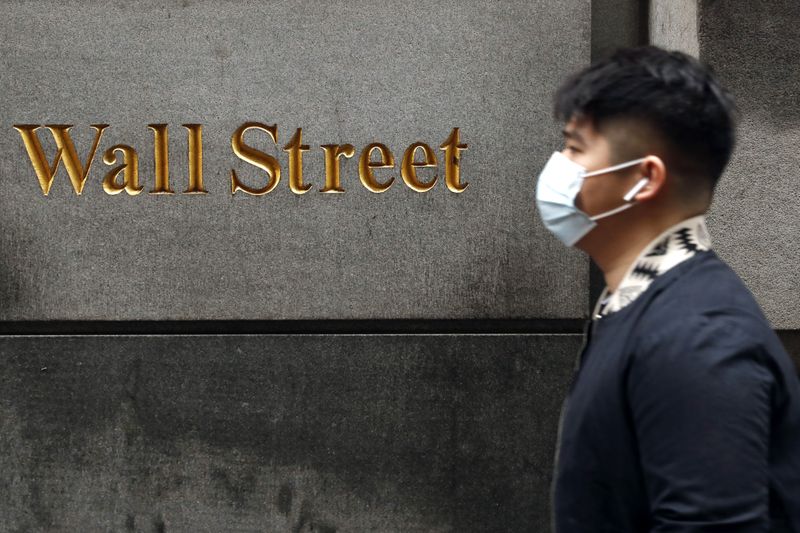LONDON (Reuters) –
1/ POWELL TAKES (VIRTUAL) CENTRE STAGE
A lot has been riding on the Fed in recent months: risk assets have surged on the back of its do-whatever-it-takes approach to propping up the economy with asset purchases and zero-bound rates during the pandemic crisis.
Now a key challenge is how to spur inflation. Fed Chair Jerome Powell may give hints on Thursday on the opening day of the Jackson Hole conference, where he will discuss the central bank’s monetary policy framework review.
The review looks at how to revamp Fed tools to guide the economy. As part of that, investors have been anticipating details on possible changes to how it targets inflation.
To guard against the possibility of higher prices ahead, investors have loaded up on assets like gold and TIPs. Still, while five-year five-year forwards – an inflation gauge – have been rising, the measure remains below the Fed’s 2% target.
Graphic: Five-year five-year inflation https://fingfx.thomsonreuters.com/gfx/mkt/ygdpzmqygvw/Five-year%20five-year%20inflation.PNG
2/NATIONAL SERVICE
Chinese banks are expected to show the scars of the pandemic and the domestic economic slowdown for the first time when they report half-yearly earnings, having bucked the Western banking sector’s downward trend in the first quarter.
The big five state banks, including Industrial and Commercial Bank of China (ICBC), China Construction Bank (CCB), and Bank of China (BoC), kick off earnings season on Aug. 28.
The government has pressed banks into service: financial institutions have been told to sacrifice 1.5 trillion yuan ($217 billion) in profit this year to support companies by lowering lending rates and fees, and deferring loan payments.
Beijing wants new loans and overall financing to top last year’s while the banking regulator has asked lenders to raise loan-loss provisions and come up with realistic profit plans. That means profits won’t be growing, as the filings will show.-China keeps lending benchmark LPR steady for 4th straight month, in line with market –-China’s banking sector expected to dispose $490 bln of bad loans in 2020 – Xinhua –
Graphic: China Big 5 banks’ earnings https://fingfx.thomsonreuters.com/gfx/mkt/gjnpwaendpw/Pasted%20image%201597988457429.png
3/ QUO VADIS, GREENBACK?
The dollar, slipping to more than two year lows in recent days, looks out of favour thanks to negative inflation-adjusted yields, weaker macro-economic data and tensions between Washington and Beijing. The downward move has fueled familiar talk about the dollar’s decline as the world’s reserve currency.
Investors are trying to gauge where next for the greenback. Intraday volatility has increased across the currency complex suggesting bearish positioning versus the dollar may be at extremes.
And unlike July, when virtually all non-dollar currencies and precious metals gained on the dollar’s 4% fall, August has been a mixed bag. The yen and the Aussie have struggled. Even gold’s eye-watering rally is showing signs of exhaustion after hitting a record near $2,100 per ounce earlier this month.
Throw in a U.S. Federal Reserve wary of pumping in more stimulus just yet, approaching U.S. elections and the greenback may find some fresh legs.
Graphic: USD positions and CFTC https://fingfx.thomsonreuters.com/gfx/mkt/nmovaqnebva/USD%20positions%20and%20CFTC.JPG
4/VALUE SIRENS
Betting on a recovery of so-called value (read cheap) stocks has become a popular mainstream call among sell-side analysts as investors scramble to assess which bits of the market the rally could lift next.
Value stocks generally lag in the first stages of a bounce-back but usually follow risk-on stocks upwards as the economic recovery unfolds. Now with hopes that a COVID-19 vaccine could be widely available in early 2021, overlooked undervalued stocks are becoming tempting targets for stock pickers.
A rotation to value, targeting banks, autos and energy value stocks has already made tentative runs, but the decade long underperformance of that segment of the market means many won’t touch them with a barge pole.
Looking at the outstanding performance of value stocks and big tech since the great financial crisis in general – and the COVID-19 market in particular – investors are wary of the value-trap.
Graphic: Rotation https://fingfx.thomsonreuters.com/gfx/mkt/bdwvkeowovm/Pasted%20image%201597745866616.png
5/(BELA)RUSSIAN ROULETTE
Belarus’s political crisis rumble on, dragging the European Union and the United States into another proxy standoff with Russia, the country’s main economic ally.
Street protests over alleged vote rigging in President Alexander Lukashenko’s ‘landslide’ election win are set to continue in Minsk. With Lukashenko refusing to re-run the vote and starting a criminal case against the opposition, it’s not obvious how the tensions get resolved.
For Moscow, Belarus is an important strategic buffer against NATO and the EU and Russia sells the country oil at below-market prices. But the relationship is testy and even Russia’s currency and bonds might now be affected by the situation, especially if sanctions come into play.
Meanwhile the hospitalisation of Russian opposition politician Alexei Navalny, the biggest thorn in the Kremlin’s side, will do little to shift unwanted attention away from Moscow, with Navalny’s allies alleging poisoning.
Graphic: Belarus bonds and rouble have been stumbling https://fingfx.thomsonreuters.com/gfx/mkt/dgkvllwwavb/Pasted%20image%201598006808103.png
(Reporting by Vidya Ranganathan in Singapore, Megan Davies, Chuck Mikolajczak and Dan Burns in New York, Saikat Chatterjee, Julien Ponthus and Marc Jones in London, compiled by Karin Strohecker in London; Editing by Toby Chopra)
























